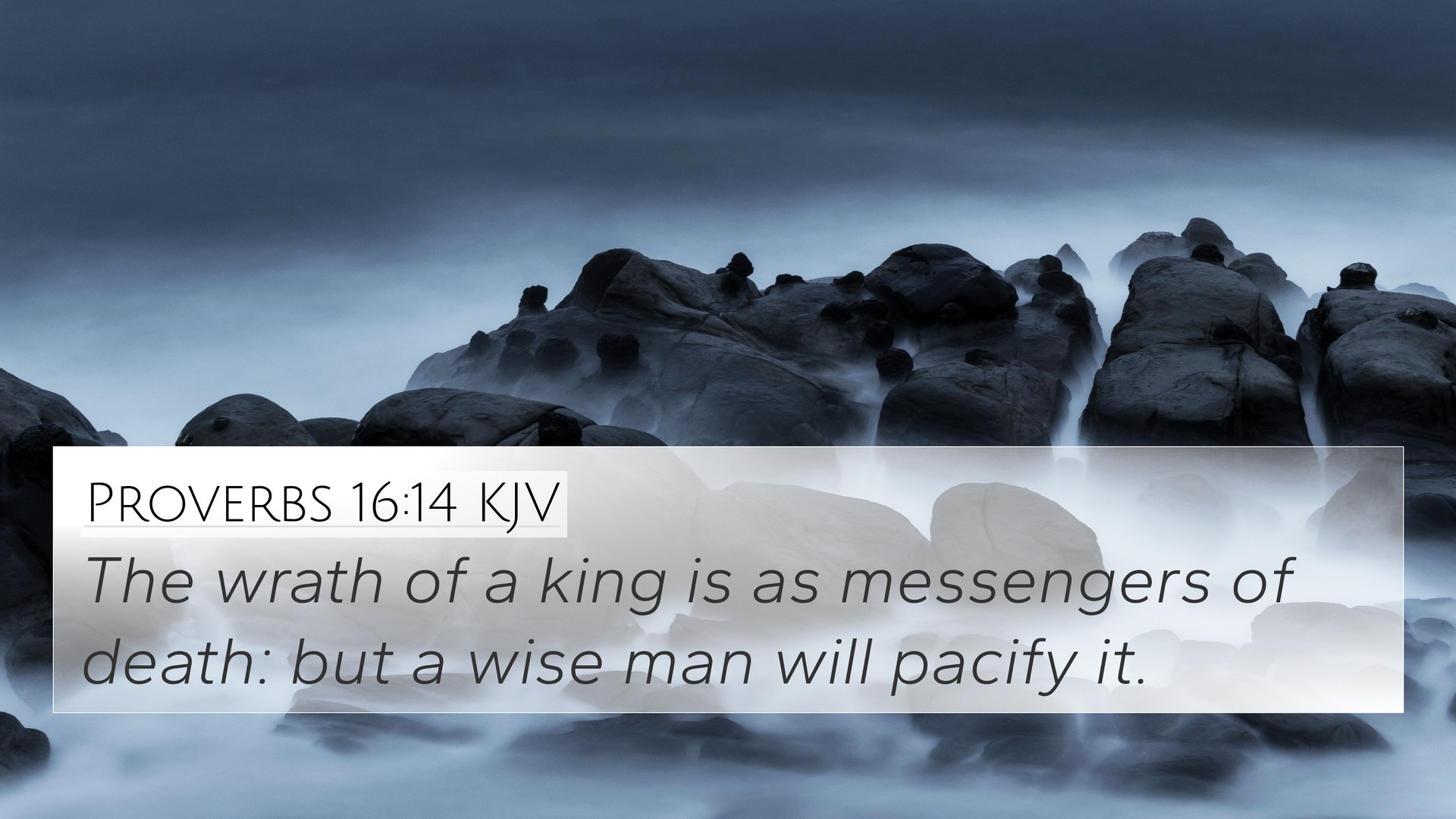Understanding Proverbs 16:14
Proverbs 16:14 (KJV): "The wrath of a king is as messengers of death: but a wise man will pacify it."
This verse encapsulates profound wisdom regarding authority, conflict resolution, and the characteristics of wise individuals. The imagery of a king's wrath likened to death emphasizes the significant power and potential consequences of those in authority. In contrast, the verse highlights the importance of wisdom in navigating these dangerous waters.
Commentary Insights
Matthew Henry's Commentary
Henry elucidates that the king represents those in power whose decisions can lead to severe consequences (death). The prudent person will understand the gravity of the situation and strive to appease the ruler's anger through wise counsel and thoughtful actions. Henry stresses the necessity for humility and discernment, stating that a wise person recognizes when to speak gently and how to diffuse tension.
Albert Barnes' Notes on the Bible
Barnes emphasizes that the phrase "as messengers of death" indicates the immediate dangers associated with provoking a ruler. He concurs that a wise man possesses the skillful ability to pacify wrath, suggesting that wisdom involves the capacity to discern when and how to act to mitigate conflict. Therefore, Barnes highlights the proactive nature of wisdom in addressing authority and the outcomes that follow from such interactions.
Adam Clarke's Commentary
Clarke focuses on the contextual understanding of a king's wrath, recognizing it as unparalleled in its potential to harm. He comments on the qualities of a wise person, noting that their calmness and judgment allow them to navigate the storm of anger and to bring peace. Clarke implies that those who exhibit wisdom can become mediators, reflecting a greater understanding of interpersonal dynamics and leadership.
Key Themes and Cross-References
Proverbs 16:14 poignantly connects to several other biblical passages, establishing a network of wisdom literature surrounding leadership and conflict management:
- Proverbs 15:1 - "A soft answer turneth away wrath: but grievous words stir up anger." This highlights the power of a gentle response similar to the pacification mentioned in Proverbs 16:14.
- Proverbs 19:12 - "The king's wrath is as the roaring of a lion; but his favor is as dew upon the grass." This asserts the need for understanding the dual nature of a king's emotions: fearsome and benevolent.
- Proverbs 25:15 - "By long forbearing is a prince persuaded, and a soft tongue breaketh the bone." Similar to Proverbs 16:14, this verse emphasizes the effectiveness of patience and wisdom in dealing with authority.
- Ecclesiastes 8:4 - "Where the word of a king is, there is power: and who may say unto him, What doest thou?" This acknowledges the immense authority vested in kings, paralleling the recognition of a ruler's wrath in Proverbs 16:14.
- James 1:19 - "Wherefore, my beloved brethren, let every man be swift to hear, slow to speak, slow to wrath." This New Testament verse encourages wisdom and restraint in communication, likened to the prudent man in Proverbs 16:14.
- Romans 12:18 - "If it be possible, as much as lieth in you, live peaceably with all men." This verse captures the essence of conflict resolution advised in Proverbs 16:14.
- 1 Peter 3:9 - "Not rendering evil for evil, or railing for railing: but contrariwise blessing." This emphasizes the call to respond wisely and graciously, akin to the wise man’s approach to a king’s anger.
Conclusion
Proverbs 16:14 delivers essential principles for understanding authority dynamics and the role of wisdom in conflict resolution. As seen from the commentaries and the cross-referenced verses, the insights drawn from this scripture encourage readers to engage thoughtfully and wisely with the powerful figures in their lives—always aiming for peace and reconciliation.
SEO Focus: Cross-Referencing Proverbs 16:14
For those studying this verse, it’s useful to explore the following:
- How to find cross-references in the Bible - Tools for Bible cross-referencing can provide comprehensive insights.
- Identifying connections between Old and New Testament - Reflect on how New Testament teachings align with Old Testament wisdom.
- Dive deeper into themes - Looking for Bible verses related to authority, conflict, or wisdom can provide further context.
- Bible verse parallels - Understanding how Proverbs 16:14 interacts with similar scriptures can deepen interpretation.












